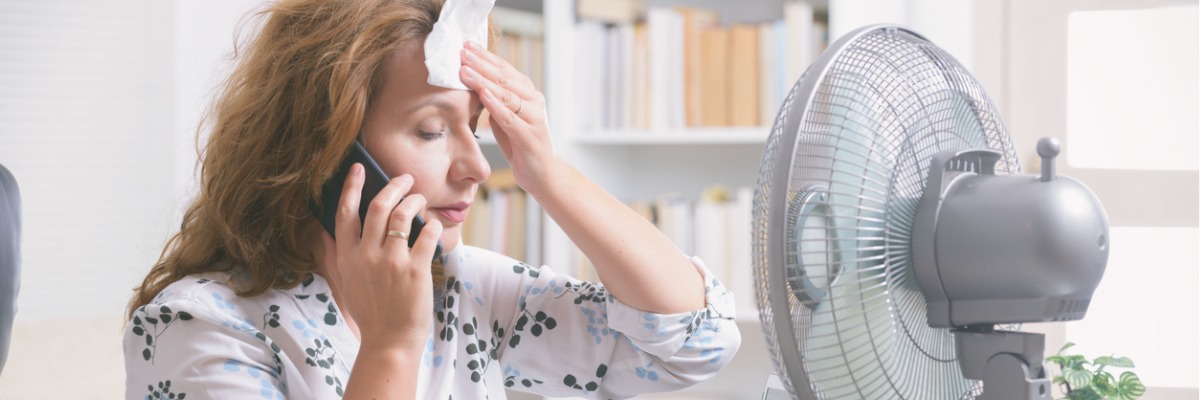Stop Hot Flashes: 7 Tips to Cool Down

A hot flash can seemingly come out of nowhere. You might be sitting at your desk working or curled up in bed trying to sleep when suddenly, you feel a flush over your skin. Your heart rate starts to quicken, and you might even break out into a sweat. A hot flash is one of the most common symptoms of menopause and can be extremely uncomfortable. If you want to stop a hot flash or reduce its intensity, the following tips may help you cool down fast.
What Causes Hot Flashes?
A hot flash is almost always caused by changes in hormone levels, specifically a decrease in estrogen. It is unknown exactly how these hormonal changes lead to a hot flash. However, it is thought that the drop in estrogen causes your body’s temperature-regulating system (hypothalamus) to become more sensitive to slight changes in temperature. This causes the hypothalamus to overreact, resulting in a hot flash.
A hot flash may last anywhere from 1 to 5 minutes and typically varies in frequency and intensity from person to person. The symptoms of a hot flash usually persist for over seven years, with some women having them for over a decade. In addition, African American and Hispanic women are more likely to experience a hot flash for a more extended period of time than Asian and white women.
7 Lifestyle Tips for Cooling Down During a Hot Flash
A hot flash may come unexpectedly. Therefore, having these tips at your disposal is key to cooling down and getting relief fast. If you’re prone to hot flashes, try one or more of these lifestyle changes:
1. Dress in layers
Wearing breathable, loose-fitting clothing made of natural fibers may help regulate your body temperature. If you begin to feel a hot flash coming on, removing a layer of clothing may help you cool down quickly. It is also a good idea to layer your bedding in case you get night sweats. Dressing and sleeping in layers may allow you to adjust to changes in your body temperature as they happen.
2. Stay Hydrated and Cool
Drinking plenty of ice water and using a cool compress may lower your body temperature and stop a hot flash in its tracks. Because a hot flash may strike at any moment, carrying a portable fan with you may also be helpful. A hot flash is more likely to occur when you are in a warm environment, so try to avoid being in hot places such as saunas or hot tubs, and keep your sleeping environment cool. Furthermore, a hot flash may cause you to become dehydrated, so drink plenty of fluids throughout the day.
3. Avoid Hot Flash Triggers
There are several triggers that may cause the onset of a hot flash, such as stress, spicy foods, caffeine, and alcohol. If you are trying to prevent a hot flash, it is best to avoid these triggers altogether. However, there may be times when you can’t avoid them. In these cases, try your best to limit your intake. Other possible hot flash triggers include warm weather, tight clothing, and stress.
4. Quit Smoking
Smoking is one of the worst things you can do if you are trying to stop hot flashes. Not only does smoking increase your risk of developing heart disease, stroke, and cancer, but it also contributes to hot flashes. This is because smoking may decrease the estrogen levels in your body, which may trigger a hot flash. Smoking is also linked to early onset menopause, which means you may experience hot flashes at a younger age. If you are a smoker, quitting is one of the best things you can do for your health.
5. Maintain a Healthy Weight
Women who are overweight may experience more hot flashes with greater intensity than women of a healthy weight. Eating a healthy diet and regularly exercising may assist you in maintaining a healthy weight and reducing the number of hot flashes you experience. Moreover, exercise may also alleviate hot flashes by reducing stress and improving sleep. Hot flashes often occur at night and can interfere with the quality of your sleep. Regular exercise during the day may help you get a good night’s sleep.
6. Try Meditation and Relaxation Techniques
With stress and anxiety being common triggers of a hot flash, relaxation techniques may help you stop them. Meditation, stretching, and deep breathing exercises are all things you can do to relax your body and mind. Before bed, take some time to do some relaxation exercises and clear your mind of any stressors. This may help you fall asleep and stay asleep throughout the night.
7. Consider Using Hormone Treatments
A hormonal imbalance may lead to several uncomfortable symptoms, including hot flashes. If you are struggling to find relief from hot flashes, hormone treatments may be an option for you. These treatments may regulate the estrogen in your body, thus reducing the number and intensity of hot flashes. Before beginning any hormone treatment, it is important to speak with your doctor to see if it is the right option for you.
Treat Your Hot Flashes with Outset
Outset is committed to helping patients find relief from hot flashes and other hormone-related symptoms with our breakthrough healthy aging programs. If you are struggling with hot flashes, contact us today to find a provider near you who may be able to help.
If you are a provider interested in offering advanced healthy aging programs to your patients, click here to learn more.
